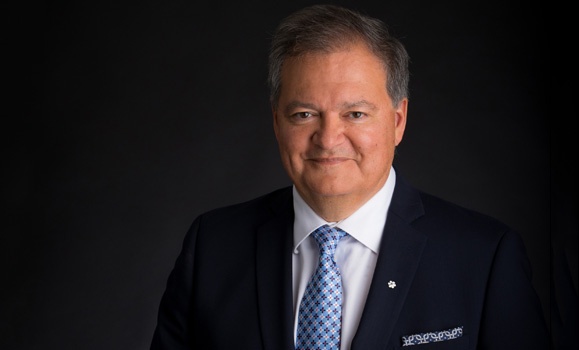This year, ¤Öêü°å¿üë½is celebrating 200 years of academic excellence, transformation, research, and community building, all of which have led to this milestone moment in the universityãs history.
One of the ways Dal is marking that milestone ã and connecting its broader community with the university community ã is with the bestowing of honorary degrees. Throughout 2018, ¤Öêü°å¿üë½will be awarding a number of bicentennial honorary degrees at special ceremonies outside of the standard Convocation ceremonies.
ä»
The first of these will take place on Monday, Feb. 5, at the Miãkmaw Native Friendship Centre in Halifax. The recipient is Dr. Michael DeGagnûˋ, the first Indigenous president and vice-chancellor of a Canadian chartered university, Nipissing in North Bay, Ont. As part of the invite-only event, there will be an afternoon panel discussion on reconciliation in education in partnership with Cape Breton University.
Leadership that inspires hope and healing
Dr. DeGagnûˋ has spent his entire career helping people and working to establish a vision and the conditions for reconciliation between Indigenous and non-Indigenous peoples in Canada. Starting with his work with provincial and federal agencies and governments, including Indian and Northern Affairs Canada and Health Canada, and continuing as the founding executive director of the Aboriginal Healing Foundation, his leadership has inspired hope and action for healing and reconciliation.
ä»
In his current role as president and vice-chancellor of Nipissing University, which he has held since 2013, Dr. DeGagnûˋ imparts his belief that education is the key to a better world and an investment in oneãs personal future. Education, he insists, has the power to transform individuals and communities.
ä»
To illustrate the power that education had on his own life, Dr. DeGagnûˋ likes to share the story of his father, who started out as a farmer and became an educator, pursuing his degree one course at a time in a church basement in Fort Frances, Ont. Today, each of Dr. DeGagnûˋãs siblings has a degree, as do each of their children.
In addition to a Bachelor of Science degree from the University of Toronto, Dr. DeGagnûˋ has a Masterãs degree in Administration from Central Michigan University, a PhD in Educational Administration from Michigan State University, and a Master of Laws degree from York Universityãs Osgoode Hall.
A powerful partnership
Dr, DeGagnûˋ has had a longstanding relationship with Dalhousieãs Schulich School of Law. In 2009, along with Professor Jennifer Llewellyn, he developed a short, intensive course on the Indian Residential Schools Settlement. He has returned to ¤Öêü°å¿üë½every year since to deliver the course with Llewellyn, giving several public lectures, to both students and the wider community, during his visits.
He also recently agreed to serve on Dalãs Indigenous Advisory Council. His long-standing relationship with the law school has provided significant inspiration and support for students, staff, and faculty.
ä»
In her letter of nomination, Prof. Llewellyn writes: ãDr. DeGagnûˋ has taken seriously the importance and power of education and knowledge as a means of empowering and enabling others to succeed in efforts toward justice and reconciliation. His commitment to education reflects his conviction that learning and understanding are foundational to the work of transformation and renewed relationships for reconciliation.ã
ä»
Schulich School of Law Professor Naiomi Metallic, the Chancellorãs Chair in Aboriginal Law and Policy, also nominated Prof. DeGagnûˋ. In her letter she writes: ãBeing the first Indigenous president of a Canadian university is no small feat, and Dr. DeGagnûˋ is a trailblazer for those of us fellow Indigenous academics. He is bringing his knowledge on healing and reconciliation to bear on the running of Nipissing University, and the institution and its students are benefiting from this.ã

